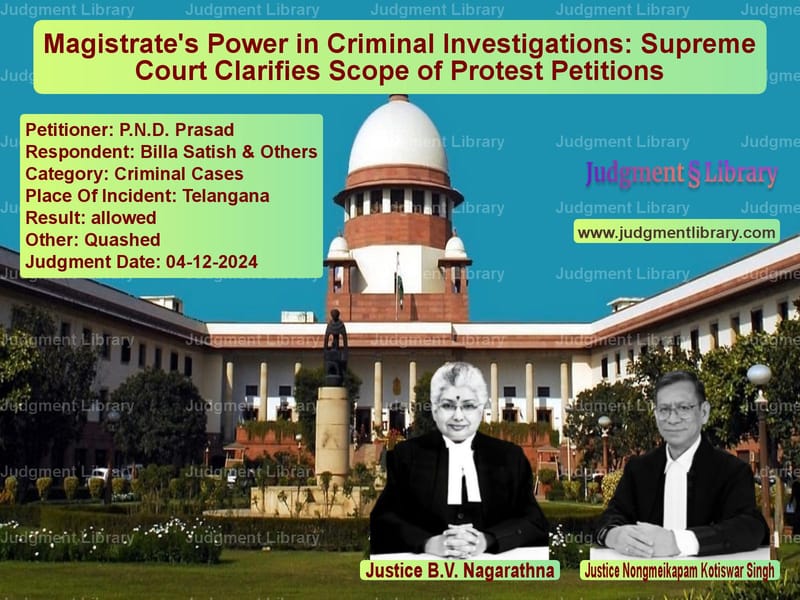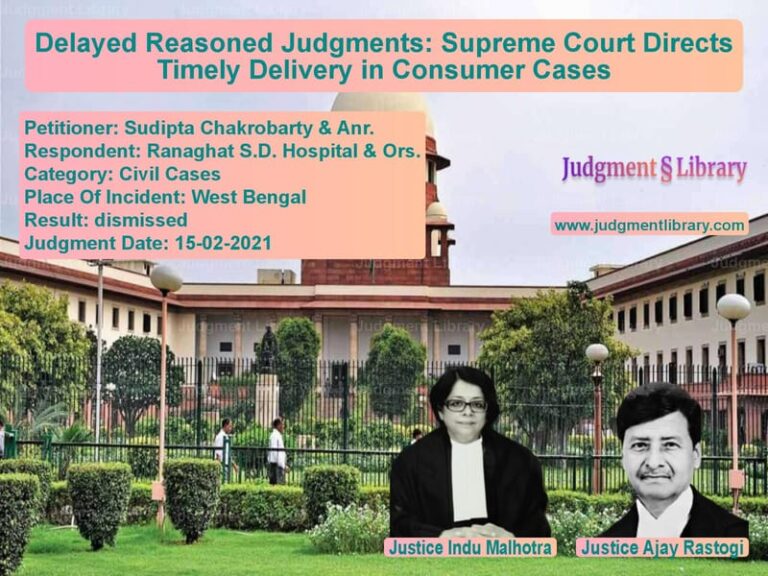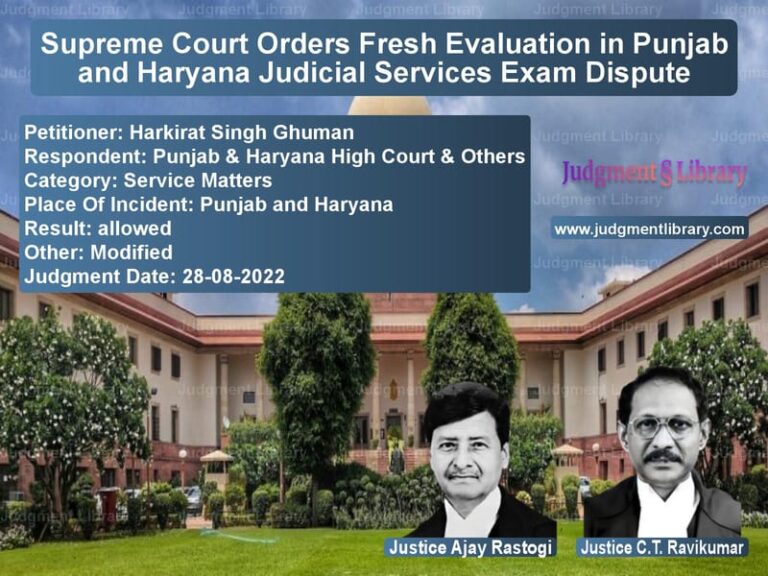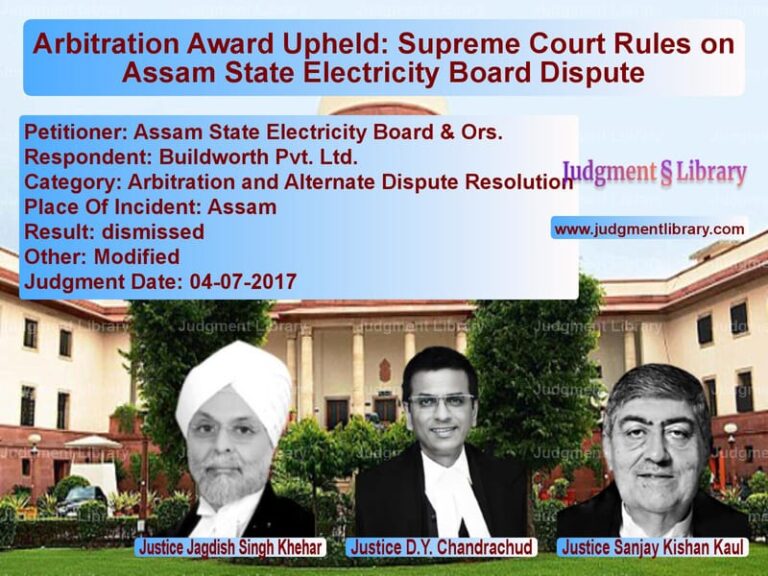Magistrate’s Power in Criminal Investigations: Supreme Court Clarifies Scope of Protest Petitions
The Supreme Court of India recently delivered a crucial judgment in the case of P.N.D. Prasad vs. Billa Satish & Others, clarifying the scope of magistrates’ powers in directing further investigations. The ruling sheds light on the legal distinction between reinvestigation and continuation of investigation after a protest petition is filed. The case originated from a complaint where the police filed a closure report, but the complainant insisted on further inquiry. The lower court directed the police to reconsider the case, which was later set aside by the High Court of Telangana. The Supreme Court’s decision reinstated the magistrate’s power while clarifying the limits of such directives.
Background of the Case
The dispute started when P.N.D. Prasad (the appellant) filed a complaint against the respondents, alleging forgery and fraud. The police investigated the case but ultimately filed a closure report stating that no sufficient evidence was found to proceed against the accused. Dissatisfied with the police findings, the appellant filed a protest petition, urging the magistrate to continue investigating the matter.
On July 21, 2014, the Metropolitan Magistrate in Cyberabad accepted the protest petition and issued an order directing the investigating agency to reconsider the case and ascertain the true facts. The respondents challenged this order before the High Court, arguing that the magistrate had no power to order reinvestigation after a closure report had been filed.
The Telangana High Court ruled in favor of the respondents, setting aside the magistrate’s order and holding that it amounted to an unauthorized order of reinvestigation. The High Court, however, refused to quash the original complaint, stating that a prima facie case still existed. Aggrieved by this decision, the appellant approached the Supreme Court.
Key Legal Issues
- Does a magistrate have the authority to order reinvestigation after the police file a closure report?
- Can a magistrate direct the police to continue an investigation based on a protest petition?
- Did the High Court err in interpreting the magistrate’s order as reinvestigation instead of a continuation of investigation?
- What is the legal remedy available when a magistrate’s directive is considered beyond the scope of procedural law?
Arguments Presented
Arguments by the Appellant
- The magistrate’s order did not amount to reinvestigation but was merely a directive to continue investigating new aspects revealed by the protest petition.
- The expert opinion and sworn statements submitted by the complainant warranted further inquiry and could not be ignored.
- The High Court misinterpreted the magistrate’s wording and wrongly quashed the directive.
- The magistrate acted within legal bounds, as the law permits courts to order further investigation before taking cognizance of a case.
Arguments by the Respondents
- The police had already submitted a closure report, and any directive to reconsider the case amounted to an illegal reinvestigation.
- The magistrate’s choice of words indicated a complete reopening of the investigation, which is not within a trial court’s jurisdiction.
- The High Court correctly found that the magistrate lacked the power to order reinvestigation after police had filed their final report.
- The magistrate’s directive should have been limited to either accepting or rejecting the closure report without instructing the police to conduct a fresh investigation.
Supreme Court’s Observations
The Supreme Court carefully examined the magistrate’s order and found that the High Court had wrongly interpreted its intent. The Court noted that:
“The choice of expression by the learned Metropolitan Magistrate may not have been appropriate. However, the meaning of the said expression could be discerned as a direction for a continuation of the investigation, having regard to the material on record.”
The Court emphasized the legal distinction between further investigation and reinvestigation:
- Further investigation: When new evidence or issues arise after a protest petition, the police may be asked to examine those aspects without reopening the entire case.
- Reinvestigation: A complete re-examination of the case, including fresh evidence collection, questioning of all witnesses, and a potential shift in findings, which can only be ordered by higher courts.
Legal Precedents Considered
The Supreme Court referred to its previous rulings in Vishnu Kumar Tiwari vs. State of Uttar Pradesh (2019) and other cases where magistrates were found to have overstepped their powers. The Court reiterated:
“If the magistrate’s directive is perceived in the context of continuing investigation and not reopening the entire case, then the observations of the High Court would be improper.”
Final Verdict
The Supreme Court ruled in favor of the appellant:
- The High Court’s observations in paragraphs 14 and 15 of its order were set aside.
- The magistrate’s order was to be construed as a continuation of investigation rather than reinvestigation.
- The magistrate was directed to proceed with the protest petition and determine the case in accordance with the law.
- The Court clarified that magistrates do have the power to direct further investigations in appropriate cases, provided they do not cross into the domain of reinvestigation.
Implications of the Judgment
The Supreme Court’s ruling reinforces the following legal principles:
- Magistrates can order the police to continue investigating new evidence without reopening the entire case.
- High Courts must carefully interpret lower court orders to avoid mischaracterizing procedural directives.
- Reinvestigation is distinct from further investigation and requires higher judicial authorization.
- Protest petitions remain a valid legal remedy for complainants dissatisfied with police closure reports.
This ruling provides greater clarity on judicial oversight of criminal investigations and ensures that complainants have a fair opportunity to present their grievances without overburdening the police with unauthorized reinvestigations.
Petitioner Name: P.N.D. Prasad.Respondent Name: Billa Satish & Others.Judgment By: Justice B.V. Nagarathna, Justice Nongmeikapam Kotiswar Singh.Place Of Incident: Telangana.Judgment Date: 04-12-2024.
Don’t miss out on the full details! Download the complete judgment in PDF format below and gain valuable insights instantly!
Download Judgment: p.n.d.-prasad-vs-billa-satish-&-other-supreme-court-of-india-judgment-dated-04-12-2024.pdf
Directly Download Judgment: Directly download this Judgment
See all petitions in Bail and Anticipatory Bail
See all petitions in Fraud and Forgery
See all petitions in Judgment by B.V. Nagarathna
See all petitions in Judgment by N. Kotiswar Singh
See all petitions in allowed
See all petitions in Quashed
See all petitions in supreme court of India judgments December 2024
See all petitions in 2024 judgments
See all posts in Criminal Cases Category
See all allowed petitions in Criminal Cases Category
See all Dismissed petitions in Criminal Cases Category
See all partially allowed petitions in Criminal Cases Category







